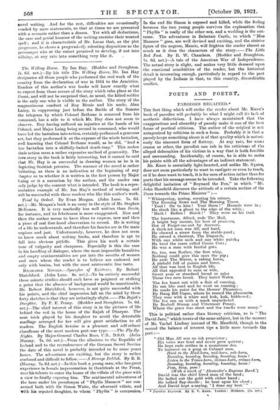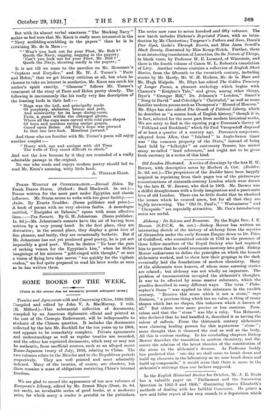POETS AND POETRY, PARODIES REGAINED.*
THE first thing which will strike the reader about Mr. Knox's book of parodies will probably be what I might call its lack of aesthetic didacticism. I have always maintained that the exaggerations and absurdity of parody make it one of the best forms of poetical criticism. The author of the original is net antagonized by criticism in such-a form. Probably it is that a parody keeps something about it of that quality which is notori- ously the sincerest form of flattery. At any rate, for 801113 reason or other, the parodist can rub in his criticisms of the alleged deformities of his victims in a way that is both forcible and unwounding. Incidentally, of course, he is able to make his points with all the advantages of an indirect statement.
Mr. Knox is essentially light-hearted, and unlike Mr. Sluire, does not seem particularly to want to castigate or even to teach, or if he does want to teach, it is for men of action rather than foe poets that his message seems to be intended. Take the following delightful imitation of " Reynard the Fox," in which " Mr. John Masefield discusses the attitude of a certain section of the Press towards the Prime Minister " :-
" Whimpering, nosing, scenting his crimes,
The Evening News and The Morning Times.
Yooi 1 On to him ! Yooi there ! Hounds were in ;
He slunk like a ghost to the edge of the whin ; Hark I Holloa ! Hoick ! ' They were on his trail.
Tho huntsman, Alfred, rode Tho A bright bay mount, his best of prancers, Out of Forget-me-not by Answers.
A thick-set man was Alf, and hard, He chewed a straw from the stable-yard ; He owned a chestnut, The Dispatch, With one white sock and one white patch; He bred the mare called Comic Cuts ; He was a man with fearful guts.
So, too, was Bother, the first whip, Nothing could give this man the pip ; Ho rode The Mirror, a raking horse, A piebald full of points and force. All that was best in English life, All that appealed to man or wife, Sweet peas or standard bread or sales These two men loved. They hated Wales.
The fox burst out with a flair of cunning, He ran like mad and he went on running ; He made his point for the Heroes' Pleasance, By Hang Bill Copse, where he roused the pheasants.
They rose with a whirr and kuk, kuk, lcukkered ; The fox ran on with a mask unpuckered By Boshull Stump and Uttermost Penny, Where the grass was short and the tracks were many."
This is political rather than literary criticism, so is " The David Jazz," which treats of the same subject, but in the manner of Mr. Vachel Lindsay instead of Mr. Masefield, though in the second the balance of interest tips a little more towards the poet :- " Old Man All was an ink proprietor ;
His voice was loud and never grew quieter ; He kept rude scribes in a monstrous den To hammer on a gong at Cabinet men.
Hark to the Mail-horn, rail-horn, sale-horn, Boomlay, boomlay, boomlay, boomlay, boom ! Listen to the Times-horn, chimes-horn, crimes-horn, Boomlay, boomlay, boomlay, boomlay, boom ! Porn, bing, pour (With a touch of ' Alexander's Ragtime Band.') David was the chief hired man of the land ; He ladled out the gold with either hand ; He talked flap-doodle ; he beat upon his chest ; And David kept a-saying, ' I done my best.' " • Paradiee Regained. By E V. Knox. London : Methuen. [53. net.j
But with its almost verbal exactness " The Mocking Navy " makes us feel sure that Mr. Knox is really more interested in the " Navy scribbling-scrabbling in the papers " than he is in criticizing Mr. de in Mare :- " Won't you look out for your Fleet, Mr. Bull ? ' Quoth the Navy, nigging, nagging in the papers Can't you look out for your Fleet, Mr. Bull 1 ' Quoth the Navy, shouting madly in the papers ; " It is not till we come to the parodies on Mr. Housman 'a " Orpheus and Eurydice," and Mr. W. J. Turner's " Paris and Helen," that we get literary criticism at all, but when ho chooses to take an interest in aesthetics, Mr. Knox clan catch his author's spirit exactly. " Glamour" follows Mr. Turner's treatment of the story of Paris and Helen pretty closely. The following is uncommonly like his really very fine description of the feasting lords in their hall :- " Huge was the hall, and principally made Of porphyry, alabaster, bronze and jade, And noteworthy for its large dining-room.
Paris, a guest within the oblongod gloom, Where all the cues were carved with cold pure shapes
Of boys and maidens eating unripe grapes,
Gazed upon Helen. All Troy's hope was pawned
In that one love-look. Menelaus yawned.'
And those who are familiar with Mr. Turner's poem will enjoy another couplet :- "Hoary with age and antique with old Timo The walls of Troy stood difficult to climb."
And not the less because by it they are reminded of a really admirable passage in the original.
No one who reads and enjoys modem poetry should fail to read Mr. Knox's amusing, witty little book.
A. WILuAx-Etus.







































 Previous page
Previous page